The short answer is yes. Baby and newborn hiccups are harmless and just one sign of a baby's growth and development.
What to do if Your Baby has Hiccups?
By: Suzanne Renee' - Updated December 19, 2023 - 7 Minute Read
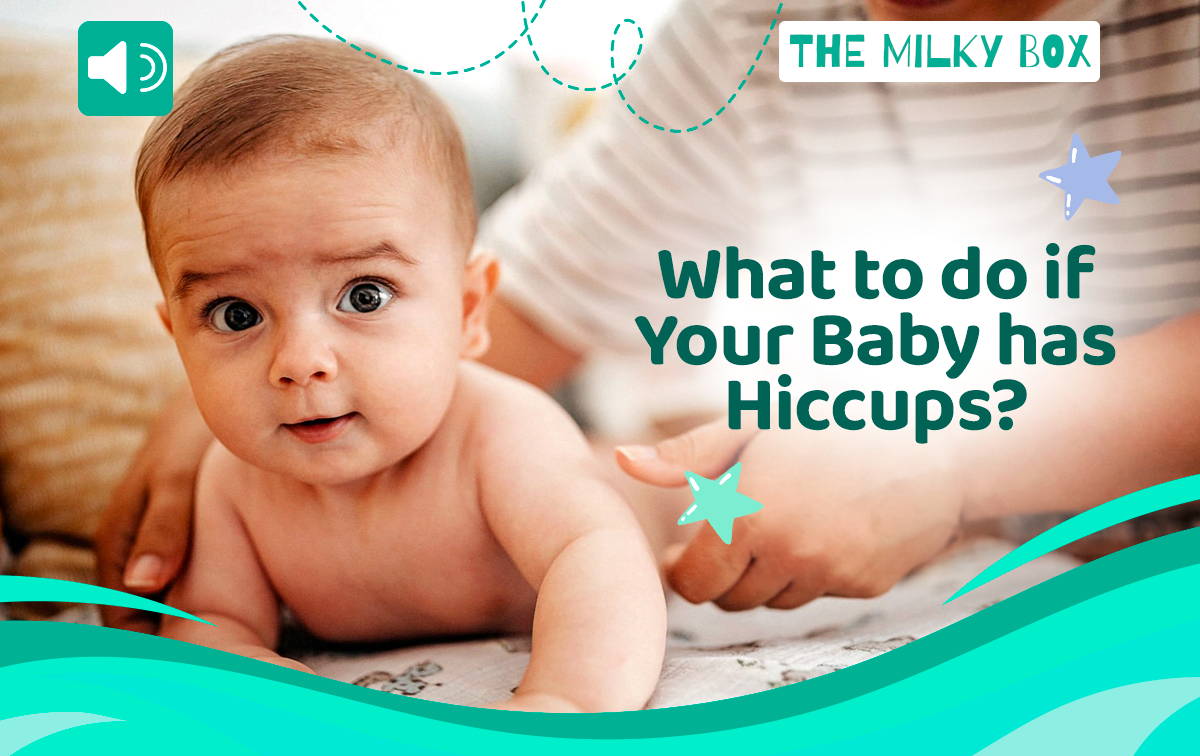
It is pretty standard for babies to have hiccups, which can start from pregnancy and may continue into the first few months after birth. While hiccups are usually harmless, they can be distressing for parents and newborns.
Fortunately, a few remedies and interventions can help alleviate hiccups. In this article, we will discuss some of these measures to provide relief for your little one.
Table of Contents:
1. What Causes Hiccups in Newborns and Babies?
2. Why Do Newborn Babies Get Hiccups?
3. How Long Do Baby Hiccups Last?
4. How to Get Rid of Baby Hiccups?
5. How to Stop Baby Hiccups in Bottle-Fed Babies
6. How to Stop Baby Hiccups in Breastfed Babies
7. How to Help Prevent Hiccups in Your Baby- What Not to Do
9. How to Help Prevent Hiccups in Your Baby
10. Frequently Asked Questions
What Causes Hiccups in Newborns and Babies?
Just like adults, newborn hiccups are sudden, involuntary spasms in the diaphragm at the same time as a contraction of the voice box, or larynx, and the total closure of the glottis, which is where the vocal cords are located.
Air is involuntarily sucked into the throat and is followed by the familiar 'hic' sound that usually stops after a few minutes. The sounds and movements can occur individually or in rhythmic bursts.
Why Do Newborn Babies Get Hiccups?
Newborn hiccups, in fact, can be a good sign that your baby is healthy and developing well.
Hiccups can happen for no apparent reason but are often noticed if the baby overfeeds, eats too quickly, or swallows too much air when drinking. These factors can cause the baby’s stomach to expand quickly. As it overexpands, it pushes against the diaphragm, triggering the spasms that lead to hiccups.
How Long Do Baby Hiccups Last?
Babies can have hiccups multiple times a day; your baby's diaphragm might become irritated if they eat too fast or too much. Other causes of hiccups can be excitement or nervousness.
Hiccups in babies can last for 10 minutes or even longer. However, parents do not need to worry if the baby acts happy and doesn't seem uncomfortable. Caregivers can confidently wait and allow your baby's hiccups to resolve independently.
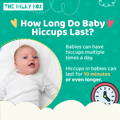
How to Get Rid of Baby Hiccups?
A baby hiccup is harmless, but there may come a time when families find it best to help their little ones find some relief.
There are several ways to get rid of hiccups in the first year. Tips include regular burping and using pacifiers.
Burp Baby
When your little one's stomach fills with air, it pushes gas against the diaphragm, causing spasms. Taking a break from feeding to burp your baby can significantly reduce this amount of air, preventing hiccups.
A good guide for infants is to take a break to burp about every 2 to 3 ounces of formula, and for breastfeeding, it is a good idea to burp the baby while switching between breasts.
Pacifier
Infant hiccups don't always start from breast or bottle feedings. When hiccups start independently, offering a pacifier will help relax the diaphragm spasms.
Gripe Water
Gripe water is a mixture of natural herbs and water often used to treat colic and other digestive worries. The herbs usually contained in these homeopathic remedies include ginger, fennel, and chamomile.
Although not specifically recommended for hiccups, this natural remedy is a well-known family “cure.” If indigestion is involved in the physiology of the hiccups, it may help, as these typical herbs are known as digestive aids in herbal medicine, termed ‘carminatives.’.
Baby Back Rub
A direct method of relieving hiccups is to support your baby in an upright sitting position and gently rub their lower back up to the shoulder in circular motions.
Be gentle with your movements and pressure not to hurt your little one. These motions will help to loosen the tension in the diaphragm, which can relieve hiccups.
Smaller Feedings
Generally, if your baby's hiccups are related to feeding, belly distention, or reflux, to alleviate hiccups start by offering smaller amounts more often.
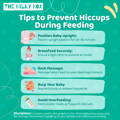
How to Stop Baby Hiccups in Bottle-Fed Babies
In general, try to help your little one relax. Hiccups usually go away on their own, but if they haven't gone away, it may be best to try one of the mentioned remedies before offering a bottle.
A tummy full of pressure is not the best time to introduce more liquid.
Paced Feeding
Paced Bottle Feeding is a bottle-feeding method that allows the infant to control the feeding pace. This feeding method slows down the flow of milk into the nipple and the mouth, allowing the baby to eat more slowly, take breaks, and be free of digestive worries.
Paced feeding reduces the risk of overfeeding and hiccups that may result. This feeding method is recommended for any baby receiving full or part-time bottles.
Baby Bottle
When bottle-feeding, tilt the bottle to a 40–45-degree angle. This angle allows the air to stay at the bottom of the bottle, not in the baby's tummy.
Choose your baby bottle carefully, as some trap more air than others. If the baby seems to be swallowing a lot of air or has increasing hiccups, try another baby bottle brand or style.
How to Stop Baby Hiccups in Breastfed Babies
Breastfed littles have frequent hiccups, which can be pretty loud. Similarly, a baby's hiccups often bother the caregivers more than they seem to bother the baby and usually go away independently.
Effective Latching
Too much milk mixed with too much air can cause infant hiccups. Correct latching ensures that your baby's lips should have a tight seal keeping air out and regulating milk flow.
Switch Sides
Breastfed babies also need to be burned. Burping between breasts may help bring up air bubbles and prevent some spitting up.
To burp your baby, gently rub or pat her on the back when switching breasts. Thumping your baby on the back can make your baby spit up all the milk that was just taken.
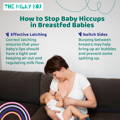
How to Help Prevent Hiccups in Your Baby- What Not to Do
Some well-known hiccup remedies are rooted in tradition and have no scientific basis. Please steer clear of these supposed remedies. Some can distress a baby and may even be dangerous. They are doubtful to stop the hiccups.
We do not suggest making your baby jump, pulling their tongue, or placing them upside down when they drink. Please check with your medical provider before you try these, or any other home remedies, on your baby.
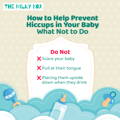
Gastroesophageal Reflux
Reflux usually starts before a baby is eight weeks old and gets better when your little one starts the toddler years. Symptoms of reflux in babies include bringing up milk, coughing, and hiccupping during or shortly after feeding.
Feeding Time
Excess gas and other symptoms of acid reflux can be relieved to help prevent hiccups with the right baby formula. European organic nutrition is specifically designed for babies with reflux and can help when hiccups occur due to gastroesophageal reflux.
When digestive worries or medical situations make it hard for babies to tolerate, some of the natural properties of cow's milk anti-reflux formulas are often the answer.
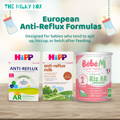
How to Help Prevent Hiccups in Your Baby
Families can rest assured that most of the time, baby hiccups tend to pass independently, with very few interventions needed.
Parents and caregivers can count on The Milky Box for nutrition to soothe sensitive tummies while providing a formula that closely mimics breast milk when prevention is needed.
Frequently Asked Questions
Are Baby Hiccups Normal?
Do baby hiccups hurt?
It is usually not harmful at all. Families can feel comfortable leaving a baby to stop hiccupping. If they continue for a reasonable time, speaking to a doctor is a promising idea.
When should families worry about Hiccups?
If the hiccups persist and seem to be causing baby distress, call your pediatrician to find out if your little one’s symptoms should be medically reviewed.
Disclaimer:
Please be aware that this information is based on general trends in babies, and it is not medical advice. Your doctor should be your first source of information and advice when considering any changes to your child’s formula and when choosing your child’s formula. Always consult your pediatrician before making any decisions about your child’s diet or if you notice any changes in your child.
Breastfeeding is the best nutrition for your baby because breast milk provides your child with all the essential nutrients they need for growth and development. Please consult your pediatrician if your child requires supplemental feeding.

Suzanne Renee' is an accomplished professional with extensive expertise in the area of infant nutrition, dedicated to promoting the health and wellbeing of children. She started this journey as a foster parent. Suzanne has emerged as a strong proponent of the European baby formula and has become a full time writer of the subject. In her free time, she enjoys camping, hiking and going to church.
Read Next:
Reviewed by Dr. Eric Wood, ND, MA

Dr. Wood is a licensed naturopathic doctor, with a doctorate degree from the Canadian College of Naturopathic Medicine in Toronto, Canada. He received his post-graduation certification in Mind Body Medicine at Harvard University.
With 15 years of experience, Dr. Wood is an Associate Professor of Holistic Nutrition at the American College of Health Sciences in Portland, Oregon. Dr. Wood is an educator, clinician, author, media figure, consultant, and owns his own holistic (naturopathic) medical practice in Ft. Lauderdale, Florida. Dr. Wood is currently researching and drafting books on cancer and pediatrics.
Outside of the medical profession, Dr. Wood loves singing with the Miami Lyric Opera and is an avid musician in South Florida. He also loves spending time with his wife and kids.

